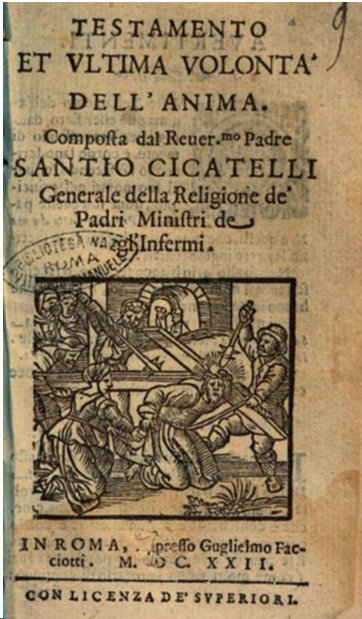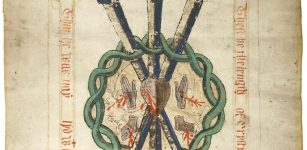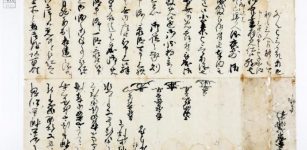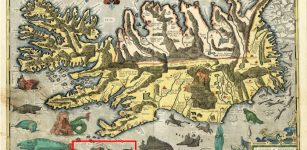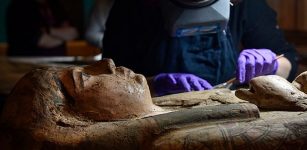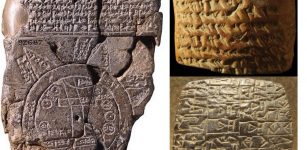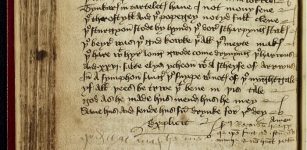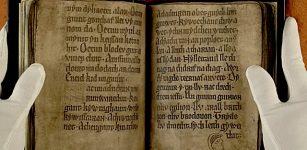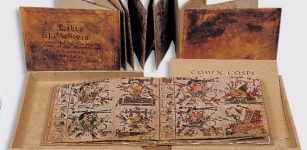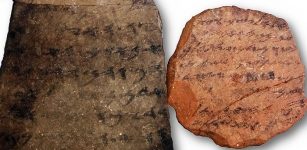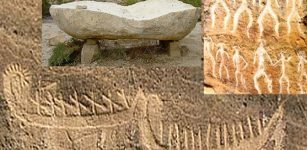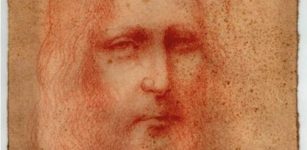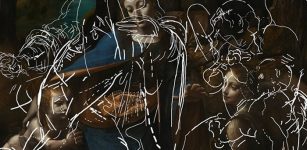Incredibly Rare Manuscript Written By Shakespeare’s Unknown Sister Joan Found
Jan Bartek - AncientPages.com - Most have heard of the great English playwright William Shakespeare (1564 - 1616), but his sister Joan is much less known, but this may change now.
A scholar from the University of Bristol has made a fascinating discovery by examining digital versions of an extremely rare 17th-century Italian religious manuscript. Contrary to previous beliefs, a long-lost document once thought to be penned by William Shakespeare's father was actually authored by his relatively unknown sister, Joan.
William Shakespeare's family by Perine, George Edward, 1837-1885. Credit: Public Domain
The document in question is a religious manuscript in which the writer vows to die adhering to the Catholic faith. This was written during a period in English history when Catholicism faced severe disapproval. The document was discovered around 1770 by a bricklayer concealed within the rafters of Shakespeare House in Stratford-upon-Avon.
Two early Shakespeare scholars had the opportunity to observe and describe this document before it went missing. Both scholars hypothesized that it might have belonged to John Shakespeare, William Shakespeare's father, who passed away in 1601. If true, this would suggest that John was an ardent covert Catholic during the Elizabethan era - a time when secret priest holes existed, and individuals risked torture for their religious beliefs.
St. Nicholas Owen, a Jesuit born around 1562 and the son of a carpenter from Oxford, was the mastermind behind the creation of priest holes. As a skilled stonemason, he dedicated his life to protecting persecuted Catholics. However, his brilliant invention came at a great personal cost. He was imprisoned in the infamous Tower of London, where he was tortured and tragically sentenced to death.
When scientists examined the 17th-century manuscript, they initially thought it was a forgery designed to give the impression of being a document from John's lifetime.
The document is a translation of an Italian manuscript titled "The Last Will and Testament of the Soul." Professor Matthew Steggle, from the Department of English at the University, utilized resources such as Google Books and various internet archives to locate early editions of this text in Italian and six other languages. Many of these editions are unique copies dispersed throughout European libraries. This investigation confirmed that the document originated several years after John Shakespeare's death. Furthermore, it established that Joan Shakespeare, who lived from 1569 to 1646 and was the only other possible J Shakespeare, was indeed the author of this manuscript.
She was born five years after her brother William, and during the latter part of his life, she was his only notable living kin apart from his wife and daughters. Her entire life was spent in Stratford-upon-Avon, where it is believed she married a tradesman with no wealth. She became a mother to four children and survived both her spouse and renowned brother by three decades. She lived a quiet life in a section of the ancestral Shakespeare family home.
John Shakespeare's house, believed to be Shakespeare's birthplace, in Stratford-upon-Avon. Credit: John - CC BY 2.0
"Even 30 years ago, a researcher approaching a problem like this would have been based in a single big research library, using printed catalogs and even card catalogs to try to find copies of this text. But research libraries have now made many of their resources available digitally so that it is possible to look across many different libraries in different countries at once, and what's more, you can look through the whole text, not just at the title and other details.
There are only seven surviving documents from Joan's lifetime that even mention her by name. Virginia Woolf wrote a famous essay, 'Shakespeare's sister', about how a figure like her could never hope to be a writer or have her writing preserved, so she has become something of a symbol for all the lost voices of early modern women. There are hundreds of thousands of words surviving from her brother, and until now none at all, of any description, from her," Professor Steggle said.
Title-page of Santio Cicatelli, Testamento et vltima volont?a dell’anima (Rome: Guglielmo Facciotti, 1622). Published by the National Central Library of Rome. Credit: Public Domain
Quotes from the document include:
"I, [Joan] Shakespeare, do protest that I will willingly accept of death in whatsoever manner it may befall me, conforming my will unto the will of God; accepting of the same in satisfaction for my sins and giving thanks unto his divine majesty for the life he hath bestowed upon me."
"I, [Joan] Shakespeare, do here protest that I do render infinite thanks to his divine majesty for all the benefits that I have received as well secret as manifest… but above all for his so great expectation of me to penance, when he might most justly have taken me out of this life when I least thought of it, yea even then when I was plunged in the dirty puddle of my sins."
"I, [Joan] Shakespeare, do protest that I am willing, yea I do infinitely desire and humbly crave, that of this my last will and testament, the glorious and ever Virgin Mary, mother of God, refuge and advocate of sinners, whom I honor specially above all other saints, may be the chief Executrix together with these other saints my patrons, Saint Winifred, all whom I invoke and beseech to be present at the hour of my death that she and they may comfort me with their desired presence and crave of sweet Jesus that he will receive my soul into peace."
St Winifred, referenced as a patron saint in this context, was a Welsh princess from the seventh century who miraculously survived decapitation by a disgruntled suitor and subsequently established a nunnery. Her story, which primarily revolves around resisting inappropriate advances from men, resonated strongly with women. This further suggests that the document is associated with Joan.
Such pledges were about asserting control over one's own demise and expressing final beliefs before death, which could potentially affect cognitive abilities. The document linked to Joan Shakespeare is unique in Britain, and only a few similar examples are known to exist on the European continent.
"For reasons of date, the “Spiritual Testament” cannot belong to Shakespeare’s father. Biographical deductions based on that assumption are untenable in their current form. It might, however, belong to his sister, a possibility that is surely relevant to current and emerging work on Shakespeare and Catholicism. And, at the risk of making an obvious point, there is a strikingly
gendered element to the story I have told here.
Despite being the sister of the most famous writer in Western history, Joan Shakespeare Hart is almost unknown; she is truly the “Shakespeare’s sister” of Virginia Woolf ’s famous essay of 1925, a figure so trapped by gender conventions that it seems there is no chance of finding anything she wrote or created. And yet perhaps there is a profoundly personal statement of her religious faith that had already been in the public domain for over a hundred years at the point that Woolf wrote her essay.
If the current essay is correct in its assertion, then it is ironic, and sadly appropriate for Woolf ’s thesis, that Joan’s spiritual testament has for all these years been wrongly assigned to her father," Professor Steggle concluded in his study.
The study was published in the journal Shakespeare Quarterly
Written by Jan Bartek - AncientPages.com Staff Writer



